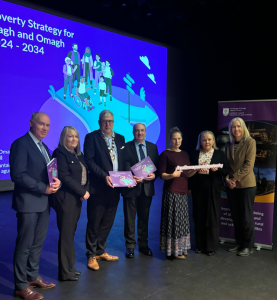The new Executive must address poverty – urgently
5 February 2024
By Becca Bor
Stormont has returned over the weekend after two years of a complete dereliction of its duty. In that time we have seen an increase in poverty for the most vulnerable in our society, particularly our children. We welcome the return of Stormont, and we want to remind the incoming Executive of their legal obligation to enact an Anti-Poverty Strategy based on objective need.
Here, NIAPN lays out some of the key principles and recommendations for an Anti-Poverty Strategy, which should be acted upon immediately. Importantly, the evidence is there. The organisations that have been tirelessly campaigning are there. The voices of those experiencing poverty are there. The recommendations are there. We just need the political will and bravery to actually prioritize those who have been failed the most by years of austerity, low wages, welfare reform and wealth inequality.
Any anti-poverty strategy must aim to fully eradicate poverty, and include an Act with concrete, measurable targets to deliver that aim.
An Anti-Poverty Strategy must be implemented, reviewed and revised in collaboration with people with lived experience of poverty. Listening to people living in poverty, including children and others in minority groups, is paramount.
The Anti-Poverty Strategy must be an economic strategy that aims to raise incomes of the population and reduce expenditure. Incomes must be raised through increased wages, removal of barriers to work, such as implementing a childcare strategy, and by increasing social security payments. Expenditure can be decreased by strengthening public services, implementing a “free school day”, subsidizing childcare, investing in more energy efficiency programmes, etc.
An effective anti-poverty strategy will involve investment. It is not good enough for the Executive to claim poverty. The Executive needs to demand further funding from Westminster and argue for revenue raising that targets raising funds from those with the broadest shoulders. Any revenue raising that further taxes or increases fees for those who cannot afford it will push more people into poverty.
An anti-poverty strategy needs to look at virtuous life cycles. If we invest in our children, then we can create the conditions for them to have better health, educational, and employment outcomes. And, of course, a happier and healthier society will follow, and it will be cheaper in the long run.
To this end, NIAPN encourages investment in early years services, a child payment, a free school day, childcare subsidies, and mitigation against the two-child limit for Universal Credit child entitlement.
An Anti-Poverty Strategy needs to commit to increasing wages and removing barriers for those who want to engage in paid work.
To increase wages, the civil service and all Stormont Departments and local councils should immediately become living wage employers, including indirectly employed staff and tendered positions. Unionization should be encouraged and all barriers to collective bargaining should be removed.
Barriers to employment need to be addressed urgently. Key amongst these is a childcare strategy that allows parents of young children, particularly women, the choice to engage in paid work and have access to at least 30 hours a week of high-quality, subsidized childcare.
An Anti-Poverty Strategy must protect those dependent on social security and reverse the trend of a social security system that drives more people into poverty. Along with the Cliff Edge Coalition, we call for an immediate end to the 5-week wait for Universal Credit, the 2 child limit and support those in private rentals on Local Housing Allowance. An Anti-Poverty Strategy must also ensure that benefit uptake is improved.
This is only the beginning, and not an exhaustive list of the reforms needed – but a holistic anti-poverty strategy is a necessary, urgent and legally binding requirement of an incoming Executive.








